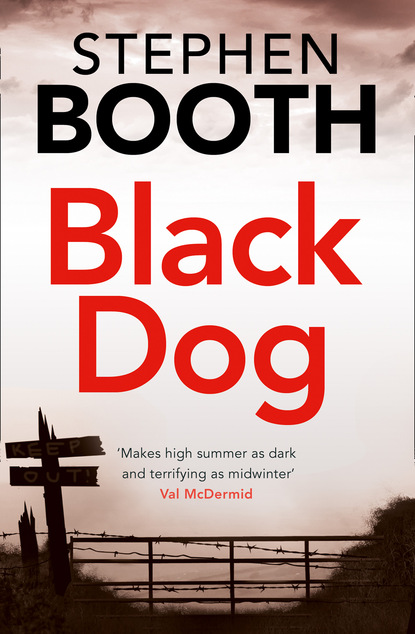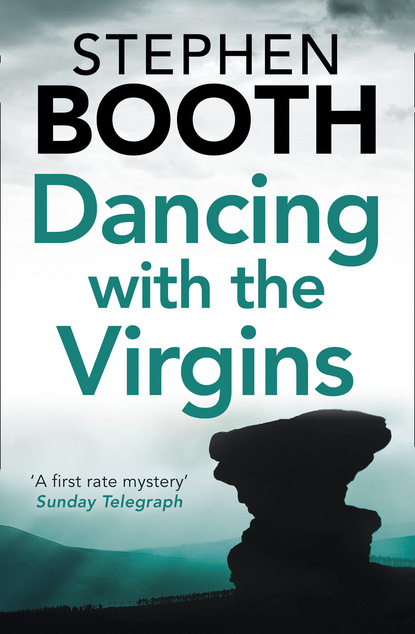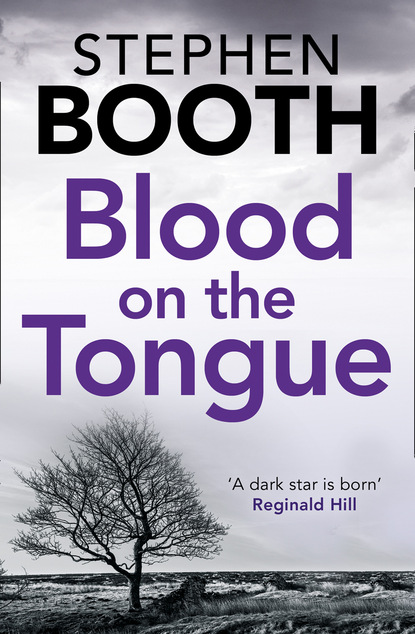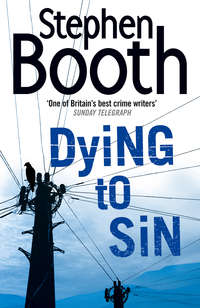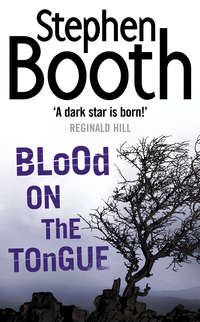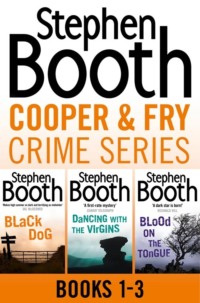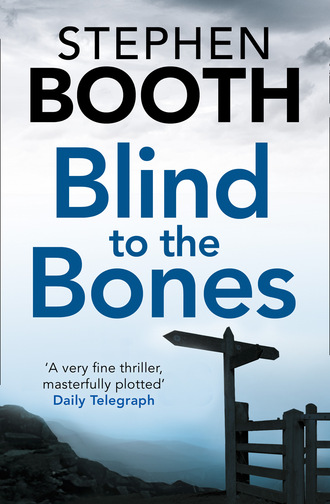
Полная версия
Blind to the Bones
‘Would you like some tea?’ said the overalled mechanic. ‘The kettle’s not long boiled.’
‘No, thanks. I have to get back to Edendale.’
‘Can’t you stop and talk for a bit? We’re just taking a few minutes’ break, that’s all.’
‘It’s a bit of a drive from Glossop.’
‘Be careful on the roads, then,’ said PC Ludlam. ‘Don’t go speeding or anything daft like that – or I’ll be after you. At least, I will once Metal Mickey here gets the bloody motor fixed. Until then, you can do what the hell you like, of course. And so can every other bugger in E Division.’
‘If you could show me the way out,’ said Cooper.
‘Are you sure you won’t have some tea?’
‘Sorry, I’m in a rush.’
‘Ah,’ said the traffic officer. ‘You’re working with Jimmy Boyce’s lot. Rural Crime Team. That was the meeting upstairs, wasn’t it?’
‘Yes.’
It had been a long day. Cooper had been up well before dawn to get from Edendale to Glossop and meet the team for the raid at the suspected drugs factory in the isolated Longdendale farmhouse. After his visit to Withens with PC Udall, there had been a series of interviews to do back at Glossop section station, and then a final debriefing meeting with the Rural Crime Team. Now, he was starting to feel dizzy with tiredness. He had eaten at some time during the day, but couldn’t quite work out how many hours ago that was.
Cooper turned back towards the garage, only to find that PC Udall had followed him out of the meeting and was standing watching him.
‘I noticed you’d gone the wrong way,’ she said. ‘It’s a bit of a rabbit warren, I’m afraid.’
‘Don’t tell anybody I couldn’t find my way out of the station.’
Udall smiled. ‘I’ll show you the way. You wouldn’t want to be in here all night.’
‘No, it’s kind of scary.’
‘Yes, it’s all the white tiles that do it. We call this the morgue.’
Later that night, two firefighters found they’d taken the wrong path as they were making their way down the hillside from Withens Moor. They were both tired and smelled strongly of smoke. Their personal water carriers felt heavy, but at least they weren’t full of water now. They had just finished a late shift damping down the hot spots that still flared among hundreds of hectares of scorched peat moor.
The two men were sweating heavily inside their suits and helmets, and cursing the distance they had to walk to get to the four-wheel-drive Land Rover that would ferry them back to their station. Crews from all over North Derbyshire had been on the moor all day, as well as a dozen Peak Park rangers and a team of gamekeepers employed by the landowners. But because of the location, even Land Rovers had only been able to ferry the men to within a mile and a half of the spreading fire and the clouds of smoke rising high above the hills. From there, they had to walk with their equipment, knowing that there was no possibility of pumping water up to the summit.
‘There’s the air shaft, Sub,’ said Leading Firefighter Beardsley.
Sub Officer Whittingham stopped and peered into the darkness. ‘It’s the wrong one,’ he said. ‘The next air shaft beyond it is where we meet the track.’
‘You sure?’
‘Well, if not, where’s the Land Rover?’
‘Right.’
As they approached the nearest air shaft, Beardsley asked if they could stop for a rest.
‘I’m knackered,’ he said. ‘This gear is killing me.’
‘Just for a minute, then.’
Beardsley eased off his water carrier and flexed his shoulders with a groan.
‘You’d think they’d have mobilized the helicopter,’ he said.
‘We’re cheaper,’ said Whittingham. ‘Besides, it’s no good for damping down.’
Though a helicopter had been on standby at Barton Airport, ready to scoop water from the Longdendale reservoirs and bomb the blaze, it had not been called on. Now it was no longer needed. Because moorland fires could burn underground for many months, firefighters had to dig deep into the peat to deal with hot spots.
‘Hold on, what’s that?’ said Beardsley.
Whittingham peered into the darkness. ‘I think you mean “who”.’
Someone was lying alongside the air shaft, stretched out on the ground with his head turned to the side, as if sleeping.
‘It’s some hiker,’ said Whittingham. ‘This is access land up here. They camp anywhere.’
‘You all right, mate?’ called Beardsley.
‘He’s asleep.’
‘I doubt it. He hasn’t got a sleeping bag or anything.’
‘That doesn’t stop ’em.’
‘Hey up, mate. Wake up.’
For some reason, neither of the firefighters wanted to go near the sleeping man. They stood back from him, as if afraid to intrude on his privacy or to make too much noise with their boots and flame-proof overalls.
‘You don’t think he was caught in the fire, do you?’ said Beardsley.
‘Why?’
‘I don’t know. He doesn’t look well to me. We should get the paramedics out.’
‘Hang on. Let’s just check.’
Whittingham laid his equipment on the heather. He bent down to the prone figure and took him by the shoulder to shake him. He got no response.
‘Paramedics, Sub?’ said Beardsley.
‘It’s a bit late for that, I think. He’s dead.’
‘No? Oh God, has this buggered up our rest time?’
‘Have you got some light there?’
Beardsley shone a torch on the figure. ‘Hey, that’s blood,’ he said.
‘Yes, I know that, Beardsley. Shine it on his face, will you?’
The torch beam moved, but failed to pick up a reflection where they would have expected white skin.
‘Bloody hell,’ said Beardsley. ‘What happened to his eyes? I can’t even see them for the blood. And his face is black. Has he been burned by the fire?’
Whittingham leaned a bit closer and took off his right glove. Avoiding the pools of blood where the eyes should have been, he touched a finger gently to the face of the dead man.
‘No,’ he said. ‘I think he did that to himself.’
9
Sunday
Sunday mornings had become a battleground for Ben Cooper. It was like going over the top in the trenches every time they opened the doors. In the minutes of waiting, he could see the whites of the eyes of the people alongside him, and feel their tension rising. Five minutes to ten, and there was still no sign of anyone on the other side of the glass.
The first time he went to do his weekly shop at Somerfield’s supermarket on Sunday morning, he thought he would be the only customer. But he was far from being alone in wanting to shop at that time. There had been a small crowd waiting outside the doors.
After his first few visits, Cooper realized he was seeing exactly the same faces each week. There was the man with the denim jeans so baggy they surely must never have fit him, and the old woman with a knitted hat pulled tight over an explosion of white curls. And then there was the little man with the walking stick and bent legs, who moved slower than everyone else and needed a shopping trolley to keep him upright and mobile.
Soon, members of this group had started saying ‘hello’ to him when he arrived, as if he’d been accepted into some sort of club. Each of them had their own little rituals once they got inside the store. Some browsed among the fresh vegetables, or rushed to be first in the queue at the delicatessen counter. Some headed straight for the cat food, or did a preliminary circuit to spot the ‘Buy One, Get One Free’ offers. Occasionally, they would pass each other in the aisles and complain that something had been moved again. There was always a small traffic jam by the cabinets where the frozen meals for one were kept.
When an assistant manager finally appeared and unlocked the doors, Cooper stood back to let most of the Sunday-morning crowd grab their trolleys and get in before him. The little man with the stick reached the doors last, as always. Cooper was just about to follow him, when his mobile phone rang. He pulled it from his belt and checked the number on the display. It was one he didn’t recognize. Work though, probably.
For some reason, the idea that the office was calling him on his rest day irritated him more than it ever had before. Previously, it had never seemed to matter. But now, the interruption of his Sunday-morning routine was different. It could upset his entire week. Sunday was for shopping, cleaning the flat or doing some ironing, a quick lunch, then an afternoon with the papers and TV before visiting his mother. Then he would finish off with an evening in the pub, where the usual crowd would be expecting him, and his usual drink would be on the counter almost before he got through the door. Even within three months, the routine had developed a reassuring predictability.
Cooper let the phone ring a couple more times as he pushed a trolley into the first aisle: fresh fruit and vegetables. In a second, the answering service would cut in, and he could pretend that he had been unavailable. Then someone else would have to take on whatever job it was they wanted him for. He wouldn’t even know what it had been until Monday morning. He wouldn’t know whether it had been something trivial, or the most exciting case of his life.
‘Oh, well,’ he sighed, as he caught the call before the next ring.
‘Hello, Ben. It’s Tracy Udall.’
Cooper had a moment’s difficulty in putting a face to the name. But then a picture of PC Udall in her body armour seemed to materialize in front of him, among the piles of carrots and parsnips.
‘Morning, Tracy. What can I do for you?’
‘I thought I’d mention that I’m on duty tomorrow, and I’ll be going up to Withens again in the morning.’
‘Yes?’
‘I’m going to talk to the Oxleys. Or try to.’
‘Good luck, then.’
‘I’ll be setting off from Glossop section station about ten o’clock.’
‘I’m working tomorrow myself,’ said Cooper, trying to puzzle out what Udall was talking about. He had only been on loan for the day of the raid. There was more than enough work to be done in CID at Edendale, even on a Monday morning.
‘Fine,’ said Udall cheerfully. ‘See you around.’ And she rang off.
Cooper shook his head as he put his phone away. But it wasn’t worth worrying over. He had fruit and vegetables to think about.
He began to fill a plastic bag with apples. Just up the aisle, the man with the stick was poking a finger at some enormous oranges that looked as though they’d been pumped up with steroids. The old man liked to trail round the aisles with Cooper whenever possible, so that he could talk to him. This morning, he was deliberately lingering in the fruit section to allow Cooper to catch up. The man with the stick never bought oranges. He was a tinned peaches and pineapple chunks man.
Then Cooper’s phone rang again.
‘What now?’
He couldn’t let it ring for long this time. He saw that the number was one of the direct lines into E Division headquarters at West Street.
‘Ah, Cooper. I didn’t think you were going to answer.’
‘No, sir,’ said Cooper, recognizing DI Paul Hitchens’ voice immediately. ‘I mean, yes. I just had a bit of difficulty because my hands weren’t free.’
‘You’re not driving, are you?’
‘No, sir.’ Cooper tucked the phone between his shoulder and ear as he pushed his trolley past the apples and drew up to the dairy cabinets. He heard Hitchens take a breath.
‘Look, I’m sorry to bother you on your rest day, but something has come up, which you need to know about before you come on duty in the morning.’
‘A case, sir? Have we got an incident?’
‘Well, not exactly. We’re loaning you out again.’
‘Sorry?’
‘The Rural Crime Team were very pleased with you yesterday. They’ve asked if they can have you for a while longer. Apparently, they have some more enquiries coming to a conclusion.’
‘Oh, but sir –’
‘The RCT are flavour of the month at the moment, you know. Rural crime has a high profile, so it’s getting priority treatment at higher levels. You know what I mean.’
‘So you’re agreeing to an abstraction, sir?’
‘For a while, Cooper. We’ll see you back here before long, no doubt. You’ll have all this rural crime cleared up in no time. I’ve got every confidence in you.’
Cooper picked up a milk carton and stared at it blankly. The confidence of your senior officers was good. But Hitchens sounded a little too confident for Cooper’s liking.
‘How long will it be for?’
‘Well … I don’t know exactly. Not at the moment. But we’ll see how it goes.’ He paused. ‘Nothing to worry about, Ben,’ he said. ‘DS Fry will be keeping in touch.’
‘Is everybody happy with this, sir?’
‘Yes, of course,’ said Hitchens. ‘Everybody’s happy.’
Diane Fry sat stony-faced, trying not to show how the news was affecting her. Inside, she felt as though her heart had dropped suddenly into her stomach. For a moment, the clematis flickered into flames, and the cat turned yellow eyes towards her as a shadow fell across its window.
‘Well, it goes without saying that I’m not happy,’ she said.
‘We all have to bear the brunt of abstractions,’ said DI Hitchens. ‘We benefit from them too, when we need them. You have to look at it from a management point of view, Diane.’
‘I can’t see the sense of this one.’
‘The Rural Crime Team say they have some major ongoing enquiries that are coming to a head. They requested assistance, and they’ve got it. End of story.’
‘I’m not happy, sir. We’re already understaffed, as you know.’
‘Of course. But what’s new?’
‘And the abstraction is in effect from when?’
‘Yesterday.’
‘Damn.’
For a while, Fry had wanted rid of Ben Cooper. She had even seen him as a threat. But that seemed a long time ago now. Instead, she was feeling aggrieved at the idea that she was going to lose him. Maybe more than aggrieved.
‘How were the Renshaws, by the way?’ said Hitchens.
‘Difficult. I don’t think they’re ever going to accept the possibility that their daughter is dead. They’re living in a fantasy world, in which they expect Emma to turn up home at any moment. That makes it very hard to talk to them.’
‘Mrs Renshaw has gone a bit nutty, I’m afraid. And she doesn’t realize it. We call it the Daft Old Biddy syndrome around here. DOBs, they are. Daft Old Biddies and Daft Old Blokes. We get plenty of them phoning the station. The control-room staff are like saints.’
‘I could use a few saints,’ said Fry. ‘All I have is Gavin Murfin.’
The man with the walking stick recognized a sympathetic listener when he saw one. He had news of crimes to pass on to Ben Cooper every week, even though he could have no idea that Cooper was a police officer. Most of his stories were culled from the newspapers, and were therefore inaccurate. But, occasionally, he had one of his own from the Edendale neighbourhood of Southwoods, where he lived.
‘Do you know, some of the old girls up my way won’t open their doors to anybody now, except Meals on Wheels,’ he said as Cooper tried to squeeze past him by the dairy products. ‘They’re too frightened, see. They had another lot of those blokes round the other day, who pretend to want to check your gas supply for leaks. So some old dear lets them, because she’s worried about being gassed during the night, or her bungalow blowing up. Then one bloke keeps her talking, while the other goes through the house and pinches her purse and stuff.’
‘Distraction burglaries,’ said Cooper.
‘It’s disgusting. It’s always the old folk they go for, you know.’
‘Yes, I know.’
‘It’s because they think we’re all stupid. Mind you, some of those old dears are stupid.’
‘They target anybody who’s vulnerable,’ said Cooper.
‘I’m not vulnerable. They have to show me identification if they want to get in my house. And I phone the council or whatever to check they’re who they say they are. They don’t like it, some of them, but I make them wait.’
‘That’s very sensible.’
‘And if I ever see one of them make a wrong move, I’ll clobber him with my stick.’
‘That’s not so sensible.’
‘Why not?’
‘Well, first of all, you might get seriously hurt if they hit you back.’
‘I don’t care.’
‘And you might find yourself on a charge of assault, if you use unreasonable force.’
‘I don’t care about that either.’
‘If you have any suspicions, the best thing to do is to call the police.’
‘Bollocks. What would they do? They don’t turn up until long after the buggers have gone, and then all they want to do is give you a number to claim on your insurance.’
Cooper’s mobile phone rang for a third time when he was in the frozen food section, jostling with his fellow shoppers for the pick of the items from the refrigerated cabinets.
‘Oh, for pity’s sake,’ he said.
A woman standing nearby, with her trolley nudging his, gave him a funny look. He had noticed her before. He always seemed to encounter her in the frozen food aisles, where their trolleys had a regular rendezvous.
He answered the phone, and heard another familiar voice.
‘Oh, it’s you, Diane.’
The woman with the trolley chose that moment to lean past him towards the frozen Chinese meals for one.
‘Sorry,’ said Cooper as he moved out of the way.
‘Ben, is someone there with you?’ said Fry.
‘Oh – just someone wanting to get into the freezer.’
‘To what?’
The woman was waving a packet at him. Spicy noodles.
‘I find these very good when you live on your own,’ she said, and smiled.
‘Oh, thanks.’
Fry’s voice was as chilly as the air rising from the lid of the freezer cabinet.
‘What’s she doing now, Ben? Offering you an ice cube?’
‘Some noodles.’
‘You’re at the supermarket, aren’t you?’
‘Yes.’
‘You always do your shopping at the supermarket on Sunday morning, don’t you, Ben?’
‘Yes.’
‘I always knew you were a man of routine, at heart. I bet you buy exactly the same things every week and speak to exactly the same people. Am I right?’
‘Maybe.’
Cooper decided to keep moving as he listened to Fry. He passed the vinegar and the lemon juice, and headed for the household goods section. He needed some disinfectant in case one of the cats made a mess in the conservatory.
‘Have you finished analysing me?’ he said.
‘I’m told you’ve been requested by the Rural Crime Team again.’
‘I’ve just heard myself.’
‘Have you asked for a transfer to the RCT?’
‘What makes you think that, Diane?’
‘Well, they’re expanding their operations. They asked for you. I thought maybe you’d been talking to someone.’
‘No, it wasn’t like that.’
‘But you’re the obvious person for them, aren’t you, Ben? You’re the one with the right background. And you know the issues. I reckon somebody with a bit of influence has put a marker on you.’
‘I didn’t apply for a transfer. Look, Diane, I’m kind of busy, so if there was nothing urgent –’
‘So you’re not planning to abandon your friends in CID, then?’
Cooper thought that probably hadn’t come out the way Fry had meant it. But he was sure she wouldn’t be surprised when he hesitated.
‘OK, it had crossed my mind,’ he said.
‘You know you should talk to me about these things, Ben. I am your immediate supervisor.’
‘I’m sorry.’
‘Or am I the reason you want to leave?’ said Fry.
‘No, Diane.’
‘I’d understand, if you told me that was the situation.’
‘I said “no”.’
Cooper started to fidget. The woman with the trolley was watching him with a quizzical look. He gave her an apologetic smile and moved a bit further away.
‘OK,’ said Fry. ‘So long as we’ve got that clear.’
‘Right.’
‘In that case, Ben, you can talk to me about your plans,’ she said. ‘We’ll make an appointment some time, and we’ll discuss it fully. I might have some suggestions about your future career.’
Cooper was silent with amazement.
‘That’s the way it’s done in a properly managed department,’ she said.
‘If you say so, Diane.’
He could hear Fry breathing and rustling some papers. He almost pressed the button to end the conversation, but sensed there was something else she wanted to talk about. Perhaps, even, the real reason for her call.
‘I expect you remember the Emma Renshaw case, Ben?’
‘The missing student?’ he said. ‘It was about two years ago.’
‘That’s right. What was the general opinion at the time? Did everyone think she was dead?’
‘Heck, I don’t know. There was no reason for her to run away from home, as I recollect.’
‘No, none that could be found.’
‘Why are you asking?’
‘Her mobile phone has been found, so we have a new line of enquiry. But most of the background I have is stuff inherited from West Midlands, which makes life a bit difficult.’
‘You also inherit Mr and Mrs Renshaw then,’ said Cooper. ‘I don’t envy you.’
‘Right. How come everybody knows about the Renshaws, except me? Isn’t it practice to keep your colleagues informed around here? Or does everyone think it’s a big joke?’
‘It isn’t my fault, Diane,’ protested Cooper.
Fry was silent for a moment. Cooper found it frustrating talking to her on the phone. He needed to be able to see her face, to try to read what he could from her expression. There was something so taut and thinly stretched about her these days, a tension that was emphasized by her narrow shoulders and lean cheekbones, and the way she had cut her hair even shorter. It meant he always found himself looking for what Fry was thinking in her eyes, rather than listening to her words.
‘I suppose Monday’s out for a meeting?’ she said. ‘You’ll be too busy with the Rural Crime Team.’
‘Sorry.’
‘We’ll make it some other time, then. Oh, and Ben? I’d take your lady friend up on that offer, if I were you.’
Cooper put his phone away and looked over his shoulder. The woman with the trolley winked at him.
The car park in front of the supermarket was full of the sound of smashing glass as couples in estate cars queued up to unload a week’s worth of wine and beer bottles into the recycling bins. Cooper wondered if this routine had replaced Sunday-morning church worship – a few minutes spent in Somerfield’s car park helping to save the planet instead of sitting in a draughty church trying to save their own souls.
The man with the stick had been lurking, ready to take up his conversation where it had left off. Unfortunately, Cooper had completely forgotten what he had been talking about.
‘I’ve got their numbers you know.’
‘Sorry?’ said Cooper.
‘The burglars. The thieves. I’ve taken their car registration numbers.’
‘I’m sure the officers investigating have found that very useful.’
‘No. They won’t even look at them.’
‘Oh.’
Cooper was starting to come to the conclusion that he had inadvertently become attached to a DOB – a Daft Old Bloke.
‘There was even a burglary the other side of the estate – at the big property, Southwoods Grange. It belongs to the National Trust, that does. The burglars got away with antiques worth a fortune. And they must have come right past my house to get there. But you can’t tell the police anything. They haven’t time to listen to the likes of me.’
‘I’m sure they’ve taken note,’ he said. ‘They probably have a lot of other lines of enquiry to follow.’
‘You sound like one of them top detectives, when they go on TV to explain why they haven’t caught a murderer or found some missing kid. They always say they have too many lines of enquiry. You’re not a top detective, are you?’
‘No,’ said Cooper.
‘I didn’t think you could be. I suppose you just watch too much telly, like me.’
‘You’re probably right.’
‘Anyway, it’s bollocks. They don’t have any lines of enquiry at all. They don’t have a bloody clue, if you ask ’em. Not a bloody clue. And when I offer to help them, they don’t want to know. What do we pay our police for, I ask you?’




